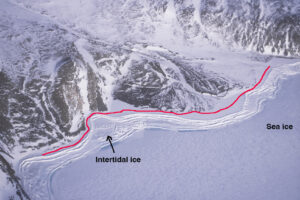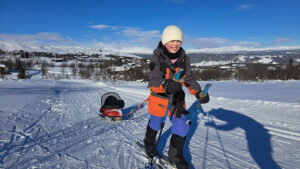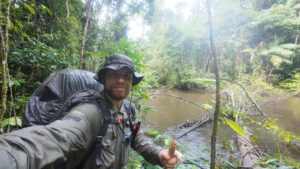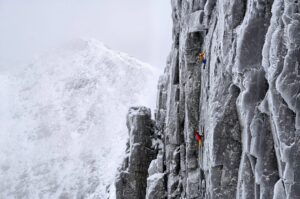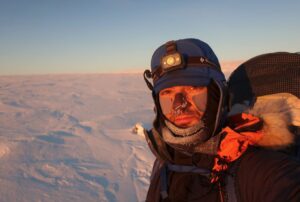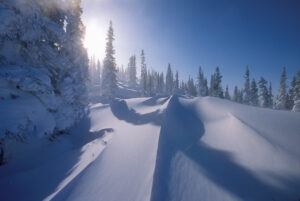After 234 days and 7,600km, Guillaume Moreau and Nicolas Roulx have completed what may be the longest Canadian wilderness expedition since 1924. From northern Ellesmere Island to Canada’s southern tip in Ontario, they covered 1,450km on skis, 2,000km by canoe, and 4,150km by bicycle. Along the way, they were joined by a rotating group of friends who completed stages of the journey that would make impressive stand-alone expeditions in their own right.
We caught up with Moreau to reflect on the journey, discuss the motivations behind such a huge commitment, and ask, what’s next?
Answers have been edited for brevity and clarity.
I’m assuming you’ve now had some rest and a chance to enjoy a return to civilization. Was there something you’d been desperately missing during the last year?
Actually, I’ve just had my second COVID jab and I haven’t felt great. We left in March before jabs were available and had to isolate for two weeks before the expedition started. Then, while cycling through Prince Albert, we were able to visit a pop-up clinic and get our first shots. Combined with media appearances and celebrating with friends and family, we’ve been quite busy.
It’s raining right now and I’m not wet
But right now, it is raining outside and I’m not wet. I’m sitting on my couch with my girlfriend and a warm cup of coffee. It’s an amazing feeling. We definitely missed good coffee.
How do you feel about the trip right now? Have you had a chance to reflect on the journey?
We’re so proud, so happy.
I tried to reflect during the biking section, but you’re still in it. We were still covering hundreds of kilometers a day and winter was coming, so we were trying to finish as quickly as possible. Snow started falling during the last two weeks, so we saw every season. We left as winter turned to spring and arrived in Ontario as winter arrived again.

Cycling in the snow. Photo: Expedition AKOR
It’s been a bit of a media storm since we finished on November 8, with lots of interviews. It has been great. It is the first time we’ve done such a big trip and the first time the media have really wanted to talk about it, but it’s so hard to talk about an eight-month journey in an eight-minute interview!
This was a crazy project and now that I’ve finished it, it seems even crazier. I think it will take several weeks, or even months, to properly reflect on the trip.
Every section was harder than expected
Did you realize quite how hard the expedition would be before you set off? Was it tougher than expected?
It was definitely harder, oh yeah man, nearly every section was harder than we expected! But we got exactly what we were looking for.
Looking at the route on Google Earth before we left, I knew that it was the most challenging route I’d ever seen for myself. Every section was going to challenge me. And this motivated us. I would not change anything. It was just enough. We made it, so we were prepared mentally and physically.

The full route is marked by black pins. The map stopped updating at Sault-Saint-Marie but the team continued down to the southern tip of Canada as shown by the red line. Photo: Expedition AKOR
The ski section to begin was so tough. That first part of the trip is another world because of the humidity and rough ice. We dealt with -25˚ to -35˚C temperatures and 80% to 100% humidity for those first four weeks. It’s crazy.
Later, we met the king of the Arctic, Richard Weber [Canadian arctic explorer who has made six full North Pole expeditions], which was amazing. His family helped with our resupply at Kasba Lake. We’re so proud that we made it, we dealt with polar rash, with everything, we toughed it out.
Many route changes
I think the first canoe section went smoothly [navigating the Back River on the way to Baker Lake] but it may be a different answer depending on who you ask from the group. It felt smooth for Nicolas and I, but we’d already been through the skiing. It probably felt much harder for Phillipe Voghel-Roberts and Etienne Desbois, who started with this section.
You made several route changes along the way, how hard were these to make? With the benefit of hindsight, would you change anything?
No, I wouldn’t change anything. We were able to make the right decisions. All the detours to avoid the Back River breakup went so well. We arrived after two big loops to avoid the river and we arrived just two days after the river was completely free of ice. The timing was perfect. I told you at the time that it was a conservative decision, but I don’t think so now, it was the only decision. It worked out so well.

From left to right: Etienne Debois, Nicolas Roulx, Catherine Chagnon, and Guillaume Moreau before leaving Baker Lake. Photo: Expedition AKOR
Most of our decisions were intuitive, they were easy to make. In Gjoa Haven, we were already looking at alternative routes. It was almost certain in my head that we were going to do this other route. Nicolas has the same vision, we have experience canoeing in transition season [when the ice on the rivers and lakes thaws] so we knew what it was like. We waited till Franklin Lake to make the decision. When we got there, it was frozen solid. There was lots of wind, the ice was still thick, it was so far from melting. So based on that, we could make an easy decision.

A network of frozen waterways. Photo: Expedition AKOR
The second canoe section was even harder
Our second canoe part changed even more, and the decisions were harder. The section was harder. We were never certain there would be enough water to paddle, yet there was so much rain and shitty weather. So many lakes, so many portages.
It was not a very beautiful route and this was the section of our expedition that I was most stressed about. We were guessing at the watershed on rivers. I wasn’t always sure we were going to make it, but it was the only way.
You’ve said that the first skiing section [800km from Eureka weather station to Resolute] was the most physically demanding, but that the canoe sections involved what you called “some very shitty lines.” Did you feel like you were manhauling more than canoeing?
The canoe sections did not feel like canoe expeditions. It was like, we need to explore this wild remote land, and we’re bringing our canoes with us!
It was a good idea to bring our canoes but most of the time we were hauling and portaging them, on ice, in the currents. But it was the only way, we needed our canoes, I don’t think we could have done our route without them. Canoes are so flexible.

Taking a canoe for a walk. Photo: Expedition AKOR
Canoe repairs
However, we were surprised by how quickly they broke. They de-laminated, cracking from the inside. We think this was a result of the canoes not being so new and the extreme conditions, particularly at night. Fortunately, our repairs worked well, they held up.
This was your first time doing big cycle and ski journeys. Have you been converted or are you still primarily a canoeist?
We all liked the biking, just not the Trans-Canada Highway. The Trans-Canada was not adapted to cycling. During one section, this road was our only option. So there are lots of trucks, and no space for cycling. You’re directly on the highway. It’s dangerous, but it’s not the kind of danger we’re used to. In remote places, there is danger but you can assess things and make good decisions. But there, there’s nothing you can do, you just hope the trucks won’t hit you. I’m not used to that. I’m just glad nothing struck us.
Biking is not really my thing, though. As soon as there is a road, I lose interest. I like places without roads.

For the final cycling section, the team expanded to six, with Isabella Donati-Simons and Beatrice Lafreniere joining the group. Photo: AKOR expedition
Nicolas and I grew up canoeing. We will always do canoe trips, but we’re looking at ski trips now. This canoe line was the hardest we’ve ever done, but we really enjoyed it. We’ll always go back to canoe trips, but it will always be for fun. I don’t think we can push it that much further than what we’ve just done.
More High Arctic in future
For me, skiing is the way to push myself as an adventurer. The High Arctic is the real deal. If you want to push yourself as an adventurer, it’s there. There’s no doubt about it, it’s where you want to go, it’s so challenging.
It seems to me that people go one of two ways after a mammoth trip like yours. Either they never do a trip of that magnitude again or they do something else equally long because they can’t go back to smaller trips, since they feel somehow lesser. What will you and Roulx do next?
That’s not quite the case for us. Unfortunately, I think most people do big trips for glory, which is not at all our mindset. We did it for fun, I’m really serious about that. What motivates us is the fun. If you’re only doing something to shine as an adventurer, it makes no sense. These big trips are too long, too risky, too expensive. We never looked at this expedition as a way to become professional adventurers. It’s not what we want to do. This was just for us.
I think our motivation was the key. It needed two guys who just wanted to enjoy it as a human experience. And we did enjoy it, a lot. So for us, it’s not the end of big trips, and it’s not the end of small trips. Every summer, I want to do canoe trips, it is my passion. I hope I can do a big canoe trip every year until I’m freaking old!
Big trips, small trips, all trips
You can’t only do big trips. If you want to do a groundbreaking trip like we’ve just done, it takes a long time to prepare but we have some ideas in mind. We already have a great team. Nicolas is only 28, he is so young, considering all the skills he already has. I know he still wants to push himself. And Jacob [Racine, who skied the first 1,450km with them] is in his prime, what a beast, and an extraordinary polar adventurer! I’m sure he will want to push some great lines with us too.

Left to right: Nicolas Roulx, Jacob Racine, and Guillaume Moreau. Photo: Expedition AKOR
Etienne [Debois] and Catherine [Chagnon] might join us too. Etienne went from Gjoa Haven to the end, it’s a friggin’ big impressive trip and he enjoyed it. So I wouldn’t be surprised if he wants to do another big trip. I think Catherine joining us was the most courageous thing. One week after I called her, she was there, ready for a 60-day canoe expedition in the Arctic. With her, it all went so smoothly, we were back as a team. It was so smooth, so perfect. Passions had been high, and it was great to have such positive energy come in.
Perhaps our next step will be to buy a sailboat to access even more of the Arctic. There’s so much waiting to be done, so many things waiting to be accomplished. We have some big ideas in mind, but we might not start working on them yet, at least for another month!

